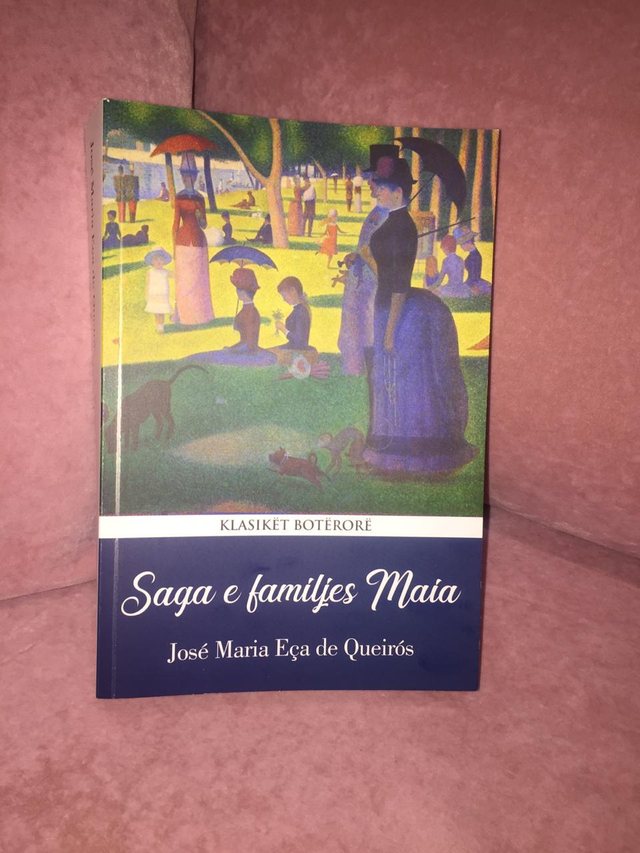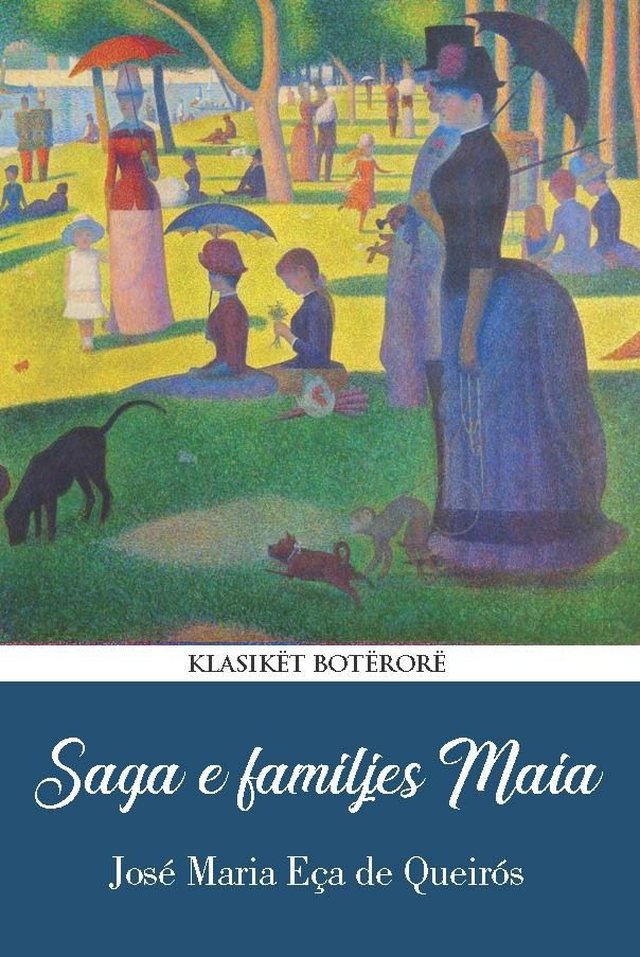
T itulli: The saga of the Maia family
Original title: Os Maias
Author: José Maria Eça de Queirós
Translated by: Ilirjana Agalliu
Genre: Roman
Date of publication: December, 2020
Number of pages: 630
Price: 1600 ALL
Collection: World Classics

The book in one sentence
A nineteenth-century Portuguese epic novel that turns into a bizarre tale of decline and ruin.
General information about the book
"The Maia Family Saga" is a classic of Portuguese literature, best known to the Portuguese writer José Maria Eça de Queirós, first published in 1888. The events of the novel take place in the second half of the 19th century and show the vicissitudes of the aristocratic Maia family in three generations, down to its most recent sucker.
Afonso da Maia, a wealthy nobleman who for years lived alone in a village estate, finally decides to return to Lisbon, to the house called Ramaljeta (House of Leaves), for the sake of his nephew Carlos, a recent medical graduate .
Carlos da Maia, heir to one of the largest aristocratic doors in mid-nineteenth-century Portugal, is rich, handsome, generous and smart. The family has depended on him for all social hopes and ambitions. The glorious past and the unsatisfactory present coexist within him all the time. A successful dandy, whose love story with Maria Eduarda sets in motion a series of coincidences that soundly intertwine Carlos' fate with that of his father and spread throughout Portuguese society.
Carlos's friends, who are also sons of nobles, wander the capital in search of pleasure as they philosophize, drink, waste time and feed on empty ideals for a Portugal they would love to see at the height of France or England. , best prove the inferiority they feel in front of strangers.
On the other hand, their loves and those of Carlos in particular, which ends with an incestuous love for his sister, increase the anxiety of waiting and turn the novel into a tragedy-comedy.
"The Maia Family Saga" recounts the unstoppable passage of time, the lost causes and the decadence of Portuguese culture and spirit.
Considered the "Best Book of the Best Portuguese Novelist" by Nobel Prize-winning writer José Saramago, "The Maia Family Saga" is a classic novel of Portuguese literature, with a Dickensian atmosphere, with a realistic style like Flaubert and Zola and a subject worthy of Shakespearean tragedy-comedies.
Critics
With a rich style, a passionate narrative and exquisite humor, Eça de Queirós fearlessly analyzes the social decadence of his era and country.
The New York Times
Eça de Queirós has captured the essence of the social stratification of the family and the way eros influences personal life. The novel crystallizes the greatest deception of an incestuous society, of a society that is heading towards disintegration.
Pubblishers Weekly
Eça de Queirós novels, filled with sexual and socially provocative novels that deal with love stories and scandals between the clergy and the middle class, are considered the forerunners of realism in Portugal.
The New York Review
Authors
José Maria Eça de Queirós (1845-1900) was a Portuguese writer, diplomat and journalist. As a writer he was committed to the social reforms that led to the introduction of Naturalism and Realism in Portugal. He is often regarded as the best Portuguese novelist of the nineteenth century, with international fame. He was the illegitimate child of a judge and spent most of his childhood in college. He studied law, but literature was what attracted him the most. Very soon, his short stories - ironic, fantastic, macabre and often shocking - as well as articles on 5 different issues would be published in the Gazeta de Portugal. In 1871, he became part of a group of Portuguese rebel intellectuals, known as the '70s Generation, who demanded social and artistic reforms.
He was the father of Portuguese realism, deeply renewed the language leading it to the current stage. He wrote most of his works outside Portugal, but always with an attention and a critical eye to Portuguese reality.
Excerpts from the book
1) His life was going by watching the passions, burning in his hands like a match. For example, the connection with the Hungarian. When he did not come to the meeting for the first time, he melted in oil with his head dipped in the pillow, and two weeks later, he sent the Baptist to the hotel, to get rid of him as soon as he saw her. Even worse with the Dutchwoman, Mrs. Rugel. For the first few days he was so obsessed with her that he thought of going after her in Holland and marrying her, as soon as she separated from her husband, but then, when she hung on her neck with her beautiful arms, to him they looked like heavy bullets ...
2) Your case is like that of Don Juan. Don Juan had this property of turning flame into ashes. Always looking for her, the ideal woman and, how to put justice in place, looking for her in the wives of others. But after sleeping with them, she said that she had lied, that she had not been appropriate. So he apologized and withdrew. In Spain there had been a thousand and three such stories. So you are as depraved as he is, so one day you will end up just like him - in Hell.
3) "What makes us endure this life, is exactly the unbridled gas, the joy. Nowadays, in Europe, man seems to have forgotten to laugh, only to smile sometimes. uncivilized, we still retain that superior gift, so comforting and blessed - as laughter is enough to make your ribs ache. "
4) […] now, poor Portugal tries to look modern, but without originality, without energy and ability to create a style of its own, unique ... and what does it do? He imitates the foreign models he sees in clothes and ideas, in behavior and laws, even to the point of cooking ... However, these people, since they lack a sense of proportion, moreover, have been put forward by impatience to looking modern and civilized, they are overdoing it with templates and distorting them to the limits of caricature.
The model of the boots that came from outside, had some top in front, but they thinned it, extended it and made it just like a needle.
5) It is all a lie, a mass pretense! Even hypocrisy. There is nothing clean left in this miserable place, not even the bread we eat!
6) Carlos saw this marriage as a union of two frustrated with life, mistreated and tired, or even scared of loneliness, so seeing these spiritual similarities to each other, they had kept burning the little fire they had left from the joy and courage of the past, to darken old age together.
7) […] everyone fails in the life he has imagined for himself, that "one day, I will become the one I love".
8) Romantics, simply inferior beings who in life are guided by feeling and not by reason.
9) Do not want anything and do not be afraid of anything. Do not hope in vain nor be upset. Accept that everything comes and goes, even quietly, just as we accept the changes of the weather with stormy days and warm days. And in this peace with yourself, set aside that part called UNI, to decompose, to disintegrate, until it is lost in the infinite universe. Above all, do not covet. And, moreover, do not faint!





